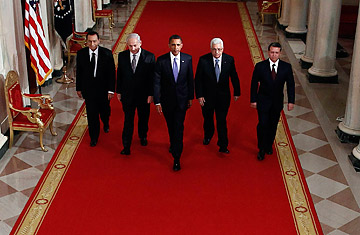
Egyptian President Hosni Mubarak, Israeli Prime Minister Benjamin Netanyahu, U.S. President Barack Obama, Palestinian President Mahmoud Abbas and Jordan's King Abdullah II, from left, walk through Cross Hall on their way to the East Room to give a joint statement on the Middle East peace talks at the White House on Sept. 1, 2010
Rather than previewing their peace proposals, the protagonists in this week's Israeli-Palestinian talks in Washington made sure everyone knew their version of who is to blame for the negotiation's widely anticipated failure. Not surprising, really, because each side's position is well known to the other, and the odds of talks bridging the gap — even "direct" ones, as opposed to those called "proximity," i.e., mediated by a shuttling U.S. diplomat — remain long.
The Palestinians warn that there will be no agreement if Israel continues expanding its settlements on occupied land. Israeli Prime Minister Benjamin Netanyahu must "choose between settlements and peace," as Palestinian negotiator Saeb Erekat put it. The Israelis note that Palestinian Authority President Mahmoud Abbas lacks the political strength to sell any deal to his people, possibly even to his own Fatah movement. Abbas governs under the shadow of his rivals in Hamas, which emphasized its rejection of a peace process in which it has no stake by launching two deadly attacks on Israeli settlers this week. The Israelis say Hamas is a proxy of Iran, whose influence is a key obstacle to peace. And if the Obama Administration wants peace, it had better get on with pulling Iran's claws.
Although this week's peace summit may mimic the rituals of its predecessors, its substance is quite different from the heady days of the Oslo process. None of the parties believe that the year of talks launched on Thursday, Sept. 2, will result in the implementation of a two-state solution anytime soon. The goal is a "framework agreement," which special envoy George Mitchell described as "more detailed than a declaration of principles but ... less than a full-fledged treaty." In other words, a guideline to be implemented on a better day.
Abbas is convinced, with good reason, that Netanyahu won't offer what he needs. After all, the Israeli Prime Minister refused to halt settlement construction or accept the 1967 borders as the basis for talks, and he insists Israel won't share Jerusalem. So the Palestinian leader has told his own people he's been dragged to Washington under threat of having donor funds cut to his aid-financed administration, effectively undermining any deal that results from the talks. Obviously, he's not expecting one. Abbas may be hoping simply to demonstrate, with Americans in the room, that Netanyahu won't willingly implement a viable two-state solution and that if Washington believes, as Secretary of State Hillary Clinton emphasized, that a two-state peace is important to U.S. national security, it had better be prepared to pressure the Israelis. Obama's retreat on the settlement-freeze standoff suggests that may be wishful thinking.
Netanyahu, for his part, is under no political pressure at home to reach agreement; on the contrary, when he resisted the Obama Administration on the subject of settlements, his domestic political standing soared — peace with the Palestinians is simply no longer a priority for the Israeli body politic. As former Camp David negotiators Robert Malley and Hussein Agha succinctly concluded in the Washington Post on Thursday, "If Netanyahu comes back with an accord, he will be hailed as a historic leader ... If the talks collapse, his followers will thank him for standing firm, while his critics are likely in due course to blame the Palestinians. Abbas will be damned if he does and damned if he doesn't."
